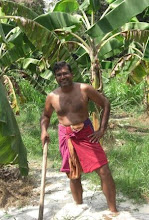
The main purpose of this site is to make a stab at getting the reader to understand some of the issues associated with the methods of agriculture adopted in Sri Lanka, understand why our productivity in this sector is one of the lowest in the world, and suggest with my current experience, ways at improving it. I firmly believe we can produce twice the output we currently do with little extra effort.
The main reason I believe is structural, based on a flawed land distribution policy. We are still continuing to distribute land to supposedly landless peasants, some good land, some not so good, all in the interests of electoral gains and not in the interests of preserving forests, or improving productivity of existing planted or cleared land. Does it not surprise you how much unutilized land we have in the country? I don’t mean cutting one more inch of the fast dwindling forest.
From my limited foray into agriculture and my extensive traveling overseas, I can assure those who don’t already know that we have such a blessed land, full of agricultural promise, where seeds planted by birds seem to feed us as much as that planted by man.
In www.rajaratarala.blogspot.com I commented on my Kotiyagala visit this week. 150+ farmers, none of whom are landless, had been given 300+ acres of scrub, previously stripped forest for agricultural use over 8 years ago. No one used it, ostensibly because there was no water supply. They were waiting for the state to provide the infrastructure. The company I represent fenced in the land, built the roads to each allotment, dug wells and dams to store water in resulting small tanks. They guaranteed a minimum price for the local varieties of papaya at 50% above the market rate, and despite the over Rs10M sunk have not got more than 20% of the families to join us in the project.
I can honestly say that if I was loaned just half that amount and given the land I would have engaged the most productive workers of the village, with suitable incentives and have the whole acreage completely planted. In my example 20 of the most enterprising households will be well compensated and have a good living while the rest just look on.
We are stuck because we have no legal way of using the uncultivated land given to the families who have not planted and give it to those who want to plant. This is highly productive very good soil. In this example we must understand we should not equally divide. This is not communism. We must give to those who can grow and take away from those who cannot, A productive farmer is stuck as he is restricted to a small allotment, and cannot increase his holding unless he has access to considerable capital to buy land. Land laws prevent those not cultivating to lease to those who want in fear that their land may be taken by them under the squatters’ rights.
I am confident that we have excellent farmers whose potential we have not tapped to the hilt, because land ownership is fraught with envy and frowned upon. Let us identify our Govi Rajas and loan them what they want, and see them prosper, as only then will the nation prosper, increase production, and reduce both unit costs and market prices.

3 comments:
Interesting!
I know for facts that there are people who live in flats in colombo and suburbs grow vegetables using very innovative methods.
Last year I saw a 3 perch garden of a white collar government worker live in Nugegoda with over ten varieties of vegetables. Infact he was more than self sufficient with vegetables.
I tried my bits and pieces on planting vegetables but failed miserably although I had a good yield from a 'Dambala wela' for a few weeks. May be I was too lazy :)
This is the 80/20 rule or the Pareto principle at work.
e.g It is a common rule of thumb in business; e.g., "80% of your sales come from 20% of your clients.
The original observation was in connection with income and wealth. Pareto noticed that 80% of Italy's wealth was owned by 20% of the population. He then carried out surveys on a variety of other countries and found to his surprise that a similar distribution applied.
Because of the scale-invariant nature of the power law relationship, the relationship applies also to subsets of the income range. Even if we take the ten wealthiest individuals in the world, we see that the top three (Warren Buffett, Carlos Slim Helú, and Bill Gates) own as much as the next seven put together.
kd 14
off white t shirt
stephen curry shoes
cheap golden goose
off white hoodie
Post a Comment